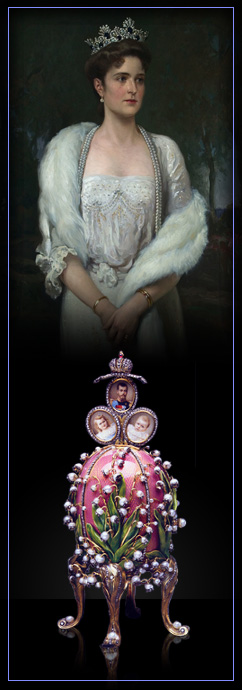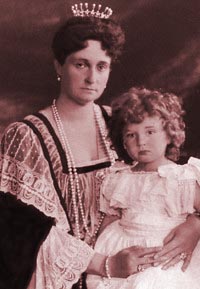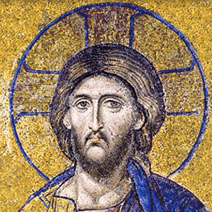Learn more about PHP programming utilizing the latest HTML 5, CSS, JavaScript and jQuery design techniques


 Chapter XIIIGathering Clouds Left: Alexandra and Alexei, photograph taken at Peterhof in 1908. Left: Alexandra and Alexei, photograph taken at Peterhof in 1908.The winter of 1905 was a time of anxiety and trouble. On January 22, 1905, the St. Petersburg workmen, led by the priest Gapon, a political agitator, made a demonstration in front of the Winter Palace. The crowd had various elements in it; some were hostile and seditious, some had been deceived by their leaders. The crowd would not disperse at the summons of the police. Troops were called in and were obliged to fire, and many workmen were killed and wounded (this was the event called "Bloody Sunday", b.a.) At this time the Emperor was inadequately supported by his Ministers. Prince Sviatopolk-Mirsky, the Liberal successor to the reactionary Plehve, had tried to promote reforms, but had difficulty in fulfilling the promises made. The Empress was in despair at the state of the country and at the Emperor's embarrassments. She could not grasp the situation properly, as she had never before come face to face with Russian internal politics. The state of her mind is shown in a letter of January 27th, 1905, to Princess Louis of Battenberg: . . . You understand the crisis we are going through! It is a time full of trials indeed. My poor Nicky's cross is a heavy one to bear, all the more as he has nobody on whom he can thoroughly rely and who can be a real help to him. He has had so many bitter disappointments, but through it all he remains brave and full of faith in God's mercy. He tries so hard, works with such perseverance, but the lack of what I call "real" men is great. Of course they must exist somewhere, but it is difficult to get at them. The bad are always close at hand, others through false humility keep in the background. We shall try to see more people, but it is difficult. On my knees I pray to God to give me wisdom to help him in his heavy task. 1 rack my brain to pieces to find a man and cannot; it is a despairing feeling. One is too weak, the other too Liberal, the third too narrow-minded and so forth. Two very clever men we have, and both are more than dangerous and unloyal. The Minister of the Interior is doing the greatest harm - he proclaims grand things without having prepared them. It's like a horse that has been held very tight in hand, and then suddenly one lets the reins go. It bolts, falls, and it is more than difficult to pull it up again before it has dragged others with it into the ditch. Reforms can only be made gently with the greatest care and forethought. Now we have precipitately been launched forth and cannot retrace our steps. All these disorders are thanks to his unpardonable folly and he won't believe what Nicky tells him, does not agree with his point of view. Things are in a bad state and it's abominably unpatriotic at the time when we are plunged into war to break forth with revolutionary ideas. The poor workmen, who had been utterly misled, had to suffer, and the organizers have hidden as usual behind them. Don't believe all the horrors the foreign papers say. They make one's hair stand on end foul exaggeration. Yes, the troops, alas, were obliged to fire. Repeatedly the crowd was told to retreat and that Nicky was not in town (as we are living here this winter) and that one would be forced to shoot, but they would not heed and so blood was shed. On the whole 92 killed and between 200-300 wounded. It is a ghastly thing, but had one not done it the crowd would have grown colossal and 1000 would have been crushed. All over the country, of course, it is spreading. The Petition had only two questions concerning the workmen and all the rest was atrocious: separation of the Church from the Government, etc., etc. Had a small deputation brought, calmly, a real petition for the workmen's good, all would have been otherwise. Many of the workmen were in despair, when they heard later what the petition contained, and begged to work again under the protection of the troops. Petersburg is a rotten town, not an atom Russian. The Russian people are deeply and truly devoted to their Sovereign and the revolutionaries use his name for provoking them against landlords, etc., but I don't know how. How I wish I were clever and could be of real use! I love my new country. It's so young, powerful, and has so much good in it, only utterly unbalanced and childlike. Poor Nicky, he has a bitter hard life to lead. Had his father seen more people, drawn them around him, we should have had lots to fill the necessary posts ; now only old men or quite young ones, nobody to turn to. The uncles no good, Mischa, a darling child still. . . . .[This was the Emperor's brother, the Grand Duke Michael Alexandrovich, then heir-presumptive to the crown.]Until the Great War the Empress took no interest in political matters. The sudden events of 1905 had greatly upset her. In the following years, when things seemed to be going on as before, the Emperor continued his habitual policy of never discussing political questions at home. The Empress scarcely ever touched on political events in her letters. She had her own interests, and exercised no influence whatever on public affairs during all those years. The year 1905 saw the gradual spread of the revolutionary movement. On February 17, 1905, the Grand Duke Serge, the Emperor's uncle and brother-in-law, was murdered in Moscow. The assassin's bomb literally blew him to pieces. He was specially hated by the revolutionists, as he belonged to the extreme reactionary party. The Grand Duke was murdered just after he had tendered his resignation. A more liberal policy had been decided on, and the Grand Duke had told the Emperor that, as this was not in accordance with his political views , he could not, in the circumstances, honestly carry on his work. The Grand Duke and Grand Duchess were only staying in Moscow till their St. Petersburg palace (across the bridge from the Anichkov Palace, b.a.) was ready for them. The unfortunate Grand Duchess was busy in her workroom at the Kremlin when the sound of the explosion reached her. She had an intuition that something had happened, rushed out, and saw the most terrible sight that a wife's eyes ever saw . . . She could never join in the life of the world again, and afterwards lived only for the poor and suffering. The Grand Duke of Hesse, with his young newly married second wife, and Princess Louis of Battenberg went at once to Moscow ; the town was in a state of ferment, and further political risings were feared. The funeral was accordingly quiet, only the Grand Duke's brother Paul and his cousin and friend, the Grand Duke Constantine, being present. The Emperor did not go to Moscow, but the Empress Alexandra Feodorovna was prevented from going only by fear of the effect it might have on her son, whom she was still nursing. The Grand Duchess Serge's first thought was for her sister, and the effect the shock would have on her. She sent telegram after telegram, imploring her to take no risks, for the baby Tsarevich's sake. "It is very hard," the Empress wrote to Princess Louis on February 20, 1905. But Princess Louis's presence at Moscow relieved a little of her anxiety and sorrow for the Grand Duchess Serge; for her two elder sisters were particularly attached to each other. In these troublous times the Dowager-Empress joined the Emperor and Empress at Tsarskoe Selo and spent the winter with them. The news continued to be bad from all sides. The spring had brought the great naval disaster of Tsushima. Commanders-in-chief were changed in the army, but still there were no important successes. The country was weary of the war, and in the face of the complications in the internal political situation it was thought inadvisable to persist in dragging on hostilities for another winter. The preliminaries for peace were discussed in America, and peace with the Japanese was signed by Count Witte at Portsmouth, U.S.A., on September 5, 1905. It is not generally known that in this matter the Emperor Nicholas II gave all the instructions to Count Witte himself. It was he who insisted that Count Witte should refuse the original conditions of the Japanese Government, which he felt were incompatible with the honour of his country. He was determined that more favorable terms should be obtained, and telegraphed orders to this effect to Count Witte, authorizing him to break off negotiations if the Japanese would not agree. This was disclosed by Count W. N. Kokovtzev, a former Russian Prime Minister, who was Minister of Finance at the time, in a lecture given in Paris in May 1927. Summer saw an agrarian movement spread from the Baltic provinces to many of the provinces of Central Russia. This movement had begun in February. Strangely enough, in many of the provinces the agitators made use of the Emperor's name, persuading the peasants that the Emperor was granting them the estates of the landlords as a reward for having fought in the war. In some places the organizers of the rising actually read out forged manifestoes. Many officials were murdered. There were naval mutinies in both the Black Sea and the Baltic Fleets. In the autumn a general strike was proclaimed. Beginning with the railways, every pulse of Russia's life was paralysed. The opinions of Ministers were at variance. At first it was hoped to remedy the situation by calling in a deliberative assembly (Sobor), such as the old Tsars used to convene in times of great emergency. After the general strike the Emperor appointed S. J. Witte as head of the Ministry, and on October 30, 1905, an Imperial manifesto announced the institution of the Duma. The Duma's rights were wider than those of the Sobor, and the manifesto granted liberty of speech, of meeting, and habeas corpus. This did not produce any immediate results, except the calling-off of the general strike, but gradually S. J. Witte's statesmanship led the country into quieter channels. In St. Petersburg there was considerable unrest, encouraged by the Soviet of Workmen's Deputies, founded by Hrustalev Nossar. The Government succeeded in closing this, and had Hrustalev Nossar arrested. He had lost the full support of the workmen; many were weary and returned to work, and when the Soviet was forcibly put down, it was already breaking up from within. It took several years to quell the revolutionary waves. There were still Jewish pogroms in different places, and the end of 1905 saw a violent rising in Moscow, which was put down by the Semenovsky regiment. The agrarian troubles in the Baltic provinces took some time to suppress. During the mutiny in the fleet lying at Kronstadt, the Empress distinctly heard the roar of cannon from her little sitting room in the seaside villa of Peterhof (the Nizhni Palace on the seashore in the Alexandria park, b.a). The Imperial couple were not frightened. In the stream of calumny showered upon them by their detractors, no one has ever dated to accuse them of want of personal courage. The Emperor was a fatalist. He did not know fear. With his wonderful self-command, the result of years of schooling, he always seemed calm and collected in whatever circumstances. In 1905, at the ceremony of the blessing of the waters, a live shell was fired in the salute, and flew over his head, crashing into one of the palace windows, but the Emperor scarcely moved, though eye-witnesses say that the sign of the cross he made at the moment was perhaps more devout than prescribed by ritual. The Empress was equally brave. She considered the possibility of attempts on their lives as inseparable from their position, and never referred to, or stopped to think of, the subject. It was just a chance that had to be faced and with her deep faith she accepted the fact that all was in the hands of God. She was, of course, anxious sometimes in later years, though she never admitted it, when the Emperor was late at some function. She gave no sign, but her anxiety could be seen in the relief with which her face lit up as she welcomed him. Before the real danger of the mutiny at Kronstadt she never trembled; and the Emperor and Empress remained at Peterhof, with their children, though Kronstadt was nearly opposite. The effect of character can be clearly seen in an incident that one of the Empress's ladies, Princess Obolensky, described to me. The Imperial yacht, the Standart, struck a rock during a cruise in Finnish waters (September 11th, 1907), happily, in broad daylight. The extent of the damage could not be seen at once. The yacht was fast making water and listed more and more to leeward, and the convoy, which drew more water, had not been able to follow the Imperial yacht into this particular channel. Sirens screeched, men ran about in obedience to commands from the officers. Boats were lowered. The Standart seemed to be sinking fast. The Empress was always resourceful and full of energy, and never lost her head in face of danger. She arranged that the children and the ladies' maids should be first lowered into the boats. Then with the help of her friend, Mme. Vyrubova, she rushed into the cabins, tore the sheets off the beds and tossed all valuables into them, making huge bundles of the most necessary and precious things. It was all done in about a quarter of an hour. The Empress was the last woman to leave the yacht. The Emperor, through all the noise and rushing about, stood calmly on deck giving the necessary orders. Princess Obolensky, coming up to him, noticed he was holding his watch in his hand and bending down to look at the water-line. She asked him what he was doing. He said that he meant to remain on board to the last, and was counting how many inches a minute the yacht was sinking in order to know how long she would stay afloat. He had calculated that there were still some twenty minutes. Thanks to the watertight compartments, and to the measures taken by the commander, the yacht did not sink, and a passing Finnish boat, the Ellekeinen, took the Imperial party on board, whence they were moved to the cruiser Asia. Happily no one suffered from anything but great discomfort and agitation. But had the seas been high, the matter would have been serious, for the yacht would undoubtedly have sunk, and the boats were very full. The state of the country from 1905 to 1909 obliged the Imperial couple to give up any journeys away from St. Petersburg. The Emperor had to be in daily communication with his Ministers. The Duma was a new institution, and many questions arose in connection with it. Shooting in Poland was given up and the Crimea was not visited. The Ministers had great fears for the Emperor's life during these times of continual political murder. He was implored to give up his solitary rides in the Peterhof Park, and his shooting. He submitted, very grudgingly, only when it was pointed out to him that it was his duty to the country. On one point, however, the Emperor was firm: he would not abandon his long walks, and every day he went out, whenever he possibly could, generally alone. Both the Emperor and the Empress disliked the police measures that were taken on their account, and dodged the detective in the parks. The Empress felt that she was being "spied upon." The police who loitered round the palace in plain clothes greatly annoyed her. She enjoyed escaping from them and delighted in Haroun-al-Raschid expeditions. She liked to drive, without even a footman, with her children or her lady-in-waiting, and had her splendid Cossack on the box only on State occasions. She liked to stop, during her drives, to enter a church or a humble shop, or to admire a view. Often at Tsarskoe Selo she would drive slowly past some villa, for she liked to see into the houses unobserved. On her long drives in the woods round Tsarskoe and Pavlovsk, a mounted Cossack of the Emperor's escort rode at some distance behind her carriage, but occasionally she dismissed even him. This sometimes gave rise to complications, though the Empress would not admit it. On one occasion an inexperienced cyclist collided with the Empress's carriage in one of the narrow lanes. The carriage had no room to swerve aside, and was overturned into the ditch, though happily none of its occupants was hurt. The coachman was hampered by the long padded coat that Russian coachmen wear (the Empress always drove à la Russe, the Court people only having the red Louis XV liveries). Finally Her Majesty herself held the struggling horses, while the young Grand Duchesses, the hapless cyclist and the coachman (when he had tucked up his robes), by their joint efforts, pulled the carriage out of the ditch. The Empress always made light of this matter, fearing that the youth who had been the cause of the accident might get into trouble, or that the coachman's feelings would be hurt by an aspersion on his driving. She said that no Cossack could have prevented this happening, and continued her unattended drives. |
|
Alexandra Feodorovna was the last Romanov Empress of Imperial Russia. This online book - The Life and Tragedy of Alexandra Feororvna was written by Countess Sophie Buxhoeveden, Lady-in-Waiting to the Empress, who served the Empress for many years and followed the Imperial family into exile. |

- Early Surroundings
- Childhood
- A Young Princess
- Engagement
- Marriage
- Her New Home
- Coronation
- Journeys
- Charities and Life
- Queen Victoria
- Foreign Trips
- Birth of Alexis
- Gathering Clouds
- On the Standart
- Rasputin
- Her Family
- Empress at Home
- Last Years of Peace
- Wartime 1914
- War Work
- Without the Emperor
- Visits to Headquarters
- Before the Storm
- Warning Voices
- Rasputin's Murder
- Revolution 1917
- Abdication of the Emperor
- Prisoners
- Five Weary Months
- Tobolsk
- Ekaterinburg 1918





